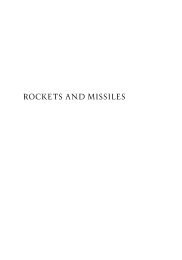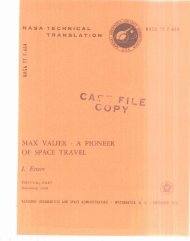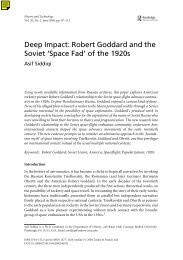- Page 1 and 2:
The Complete Book of Spaceflight Fr
- Page 3 and 4:
Contents Acknowledgments v Introduc
- Page 5 and 6:
It is astonishing to think that the
- Page 7 and 8:
4 How to Use This Book Energy 1 jou
- Page 9 and 10:
6 Able passage through a dusty medi
- Page 11 and 12:
8 additive additive A substance add
- Page 13 and 14:
10 aerobraking was one of two rocke
- Page 15 and 16:
12 aerospace medicine aerospace med
- Page 17 and 18:
14 AIRS (Atmospheric Infrared Sound
- Page 19 and 20:
16 ALOS (Advanced Land Observing Sa
- Page 21 and 22:
18 ammonium perchlorate (NH 4ClO 4)
- Page 23 and 24:
20 aniline (C 6H 5NH 2) aniline (C
- Page 25 and 26:
22 antiparticle efficient space pro
- Page 27 and 28:
24 whose main task was guidance and
- Page 29 and 30:
26 LUNAR MODULE FACTS Height: 6.7 m
- Page 31 and 32:
28 intended as simply an Earth-orbi
- Page 33 and 34:
30 lunar environment. Conrad inadve
- Page 35 and 36:
32 CSM; it transmitted data back to
- Page 37 and 38:
34 Apollo-Soyuz Test Project (ASTP)
- Page 39 and 40:
36 Ariane orbit on the 11th launch
- Page 41 and 42:
38 Ariel Ariel A series of six Brit
- Page 43 and 44:
40 Artemis Project ESA devised a fo
- Page 45 and 46:
42 asteroid missions asteroid missi
- Page 47 and 48:
44 America’s first intercontinent
- Page 49 and 50: 46 atmosphere first time in the Atl
- Page 51 and 52: 48 Avdeyev, Sergei Avdeyev, Sergei
- Page 53 and 54: 50 ballistic missile ballistic miss
- Page 55 and 56: 52 Belyayev, Pavel Ivanovich with t
- Page 57 and 58: 54 biopak their companions who had
- Page 59 and 60: 56 Black Brant in June 1969, a seco
- Page 61 and 62: 58 boat-tail deliver a two-ton nucl
- Page 63 and 64: 60 boost magazine series on spacefl
- Page 65 and 66: 62 BS- (Broadcasting Satellite) to
- Page 67 and 68: 64 Buran Program was inaugurated wi
- Page 69 and 70: 66 canted nozzle astronaut John You
- Page 71 and 72: 68 carrier and as CAPCOM (Capsule C
- Page 73 and 74: 70 cast propellant decelerate. Then
- Page 75 and 76: 72 Cernan, Eugene Andrew broken bit
- Page 77 and 78: Challenger disaster Following the e
- Page 79 and 80: 76 chemical fuel Chelomei turned hi
- Page 81 and 82: 78 circular velocity circular veloc
- Page 83 and 84: 80 Cluster Cluster An ESA (European
- Page 85 and 86: 82 Colombo, Giuseppe “Bepi” Col
- Page 87 and 88: 84 Aspacecraft in Earth orbit that
- Page 89 and 90: 86 companion body companion body A
- Page 91 and 92: 88 Copernicus Observatory longest M
- Page 93 and 94: 90 cosmic rays was the responsibili
- Page 95 and 96: 92 Crocco, Gaetano Arturo crawler-t
- Page 97 and 98: 94 Cunningham, R. Walter cryobot An
- Page 99: Daedalus, Project One of the first
- Page 103 and 104: 100 Deep Space Network (DSN) Deep S
- Page 105 and 106: 102 Afamily of launch vehicles deri
- Page 107 and 108: 104 (GEMs) for improved performance
- Page 109 and 110: 106 de-orbit burn de-orbit burn (co
- Page 111 and 112: 108 Dnepr Force base by a Thor Burn
- Page 113 and 114: 110 downlink Douglas Skyrocket The
- Page 115 and 116: 112 Durant Frederick Clark, III (19
- Page 117 and 118: Early Bird (communications satellit
- Page 119 and 120: 116 Edwards Air Force Base Echo A t
- Page 121 and 122: 118 Einstein Observatory other idea
- Page 123 and 124: 120 electrostatic propulsion electr
- Page 125 and 126: 122 energy density accelerate an ob
- Page 127 and 128: 124 Eole Envisat Envisat being prep
- Page 129 and 130: 126 escape energy Organisation). ES
- Page 131 and 132: 128 ETS (Engineering Test Satellite
- Page 133 and 134: 130 Evans, Ronald E. used to study
- Page 135 and 136: 132 Explorer Launch Explorer Spacec
- Page 137 and 138: 134 explosive bolt explosive bolt A
- Page 139 and 140: 136 FAIR (Filled-Aperture Infrared
- Page 141 and 142: 138 fission, nuclear fission, nucle
- Page 143 and 144: 140 flux it also supported AFSATCOM
- Page 145 and 146: 142 frequency coordination held) re
- Page 147 and 148: 144 FTL (Project Vela) and then as
- Page 149 and 150: 146 GAIA (Global Astrometric Interf
- Page 151 and 152:
148 gamma rays instruments and the
- Page 153 and 154:
150 GEC (Global Electrodynamics Con
- Page 155 and 156:
152 Attitude Maneuvering System (OA
- Page 157 and 158:
154 down relative to the target bec
- Page 159 and 160:
156 Gemini 9/“Angry Alligator”
- Page 161 and 162:
158 Genesis launch failed and the v
- Page 163 and 164:
160 Geotail Geotail A joint ISAS (J
- Page 165 and 166:
162 Glavcosmos John Glenn Glenn don
- Page 167 and 168:
164 Glennan, T(homas) Keith istrato
- Page 169 and 170:
166 Robert Hutchings Goddard (1882-
- Page 171 and 172:
168 Gonets Gonets A Russian messagi
- Page 173 and 174:
170 gravitational constant (G) Adva
- Page 175 and 176:
172 Griffith, George shot out of a
- Page 177 and 178:
174 guidance, midcourse guidance, m
- Page 179 and 180:
H series (Japanese launch vehicles)
- Page 181 and 182:
178 Hale, William Edward Hale The B
- Page 183 and 184:
180 Haruka flight. By the end of 19
- Page 185 and 186:
182 Helios (reconnaissance satellit
- Page 187 and 188:
184 high mass fraction two Soft X-r
- Page 189 and 190:
186 HOPE (H-2 Orbital Plane) instru
- Page 191 and 192:
188 human factors NGST (Next Genera
- Page 193 and 194:
190 hypoxia hypoxia Oxygen deficien
- Page 195 and 196:
192 IDCSP (Initial Defense Communic
- Page 197 and 198:
194 inertia inertia The property of
- Page 199 and 200:
196 Intelsat (International Telecom
- Page 201 and 202:
198 Intercosmos Intercosmos Interna
- Page 203 and 204:
200 International Space Station An
- Page 205 and 206:
202 The ISS Takes Shape The STS-88
- Page 207 and 208:
204 interplanetary magnetic field C
- Page 209 and 210:
206 interstellar space problem by h
- Page 211 and 212:
208 IRBM (Intermediate Range Ballis
- Page 213 and 214:
210 ISAS (Institute of Space and As
- Page 215 and 216:
212 IUE (International Ultraviolet
- Page 217 and 218:
214 JAS (Japanese Amateur Satellite
- Page 219 and 220:
216 Joule Joule An X-ray observator
- Page 221 and 222:
218 Jupiter A floodlit Jupiter C is
- Page 223 and 224:
220 Kennedy Space Center (KSC) Kenn
- Page 225 and 226:
222 Kiwi which he broke the sound b
- Page 227 and 228:
224 Kourou In the end, Korolev was
- Page 229 and 230:
226 Kummersdorf astronomer Gerard P
- Page 231 and 232:
L series (Japanese launch vehicles)
- Page 233 and 234:
230 Lagrangian orbit carries an arr
- Page 235 and 236:
232 laser propulsion Houston. Langl
- Page 237 and 238:
234 Lebedev, Valentin V. LDEF Havin
- Page 239 and 240:
236 leveled thrust program in space
- Page 241 and 242:
238 LiPS (Living Plume Shield) LiPS
- Page 243 and 244:
240 Aseries of Chinese launch vehic
- Page 245 and 246:
242 Lovell, James Arthur, Jr. Lovel
- Page 247 and 248:
244 Aseries of Soviet Moon probes,
- Page 249 and 250:
246 On January 15, 1973, Luna 21 to
- Page 251 and 252:
248 Lunar Prospector Lunar Prospect
- Page 253 and 254:
M series (Japanese launch vehicles)
- Page 255 and 256:
252 MACSAT (Multiple Access Communi
- Page 257 and 258:
254 Magnetospheric Multiscale (MMS)
- Page 259 and 260:
256 MAP (Microwave Anisotropy Probe
- Page 261 and 262:
258 at risk to themselves, started
- Page 263 and 264:
260 An early series of Soviet space
- Page 265 and 266:
262 Mars Express Mars Express (cont
- Page 267 and 268:
264 Mars Pathfinder (MPF) help dete
- Page 269 and 270:
266 Martin Marietta United States.
- Page 271 and 272:
268 Maul, Alfred MASTIF The MASTIF
- Page 273 and 274:
270 MECO (main engine cutoff) recor
- Page 275 and 276:
272 the suborbital journey and safe
- Page 277 and 278:
274 a drugstore. Glenn also had the
- Page 279 and 280:
276 Mercury-Atlas pilots to take th
- Page 281 and 282:
278 meteor deflection screen indica
- Page 283 and 284:
280 Milstar (Military Strategic and
- Page 285 and 286:
282 Alarge and long-lived Russian s
- Page 287 and 288:
284 modulation modulation The proce
- Page 289 and 290:
286 Mu long-wave infrared. It also
- Page 291 and 292:
288 Musudan together. Two of the co
- Page 293 and 294:
290 The Soviet counterpart to the S
- Page 295 and 296:
292 NASA Institute for Advanced Con
- Page 297 and 298:
294 NEAR-Shoemaker (Near-Earth Aste
- Page 299 and 300:
296 Newell, Homer E. Newell, Homer
- Page 301 and 302:
298 Nova (rocket) Eight of the spac
- Page 303 and 304:
300 nuclear propulsion propulsion)
- Page 305 and 306:
302 occultation Hermann Oberth Ober
- Page 307 and 308:
304 OKB-1 OKB-1 The classified Sovi
- Page 309 and 310:
306 ONERA (Office National d’Étu
- Page 311 and 312:
308 Orion, Project first century, t
- Page 313 and 314:
310 thin surface layer. So brief wa
- Page 315 and 316:
312 Osumi OSO (Orbiting Solar Obser
- Page 317 and 318:
314 Palapa Paine, Thomas O. Thomas
- Page 319 and 320:
316 parking orbit rifled barrel wit
- Page 321 and 322:
318 Pegasus (spacecraft) Pegasus (l
- Page 323 and 324:
320 Pickering, William Hayward Pick
- Page 325 and 326:
322 Early Pioneers Pioneer 3 being
- Page 327 and 328:
324 Planet Imager (PI) Planet Image
- Page 329 and 330:
326 POES (Polar Operational Environ
- Page 331 and 332:
328 pressure suit pressure suit See
- Page 333 and 334:
330 Project Daedalus throughout the
- Page 335 and 336:
332 PSLV (Polar Satellite Launch Ve
- Page 337 and 338:
“R” series of Russian missiles
- Page 339 and 340:
336 radiation protection in space s
- Page 341 and 342:
338 radiometer such as plutonium-23
- Page 343 and 344:
340 ranging ranging Techniques for
- Page 345 and 346:
342 reentry vehicle materials and t
- Page 347 and 348:
344 remaining mass remaining mass T
- Page 349 and 350:
346 Rhyolite Rhyolite A series of U
- Page 351 and 352:
348 rocket sled rocket sled A sled
- Page 353 and 354:
350 Rosetta Rosetta ESA (European S
- Page 355 and 356:
352 Rudolph, Arthur L. Rudolph, Art
- Page 357 and 358:
354 Soviet Launches Related to Mann
- Page 359 and 360:
Sagan, Carl Edward (1934-1996) A pr
- Page 361 and 362:
358 An early series of Soviet space
- Page 363 and 364:
360 Sander, Friedrich Wilhelm had b
- Page 365 and 366:
362 satellite constellation satelli
- Page 367 and 368:
364 A 6.5-m ring fixed to the top o
- Page 369 and 370:
366 Schirra, Walter (“Wally”) M
- Page 371 and 372:
368 Schweikart, Russell (“Rusty
- Page 373 and 374:
370 Seamans, Robert C., Jr. vehicle
- Page 375 and 376:
372 SERT (Space Electric Rocket Tes
- Page 377 and 378:
374 Shah-Nama by the Space Shuttle
- Page 379 and 380:
376 SIM (Space Interferometry Missi
- Page 381 and 382:
378 An experimental American space
- Page 383 and 384:
380 by the Skylab 2 crew. Two furth
- Page 385 and 386:
382 SMEX (Small Explorer) Space Fli
- Page 387 and 388:
384 Sojourner case,anellipticalorbi
- Page 389 and 390:
386 sonic speed sonic speed The spe
- Page 391 and 392:
388 Soyuz spacecraft ESA astronaut
- Page 393 and 394:
390 space drive propellants and str
- Page 395 and 396:
392 space motion sickness (SMS) the
- Page 397 and 398:
394 space sail space sail A device
- Page 399 and 400:
396 The core vehicle in NASA’s sp
- Page 401 and 402:
398 1986, it was decided to build a
- Page 403 and 404:
400 Orbiter Jerry Ross, anchored to
- Page 405 and 406:
402 Space Studies Board space stati
- Page 407 and 408:
404 Spacehab activities for the dis
- Page 409 and 410:
406 An airtight fabric suit with fl
- Page 411 and 412:
408 spacewalk package. Next, the as
- Page 413 and 414:
410 speed of sound speed of sound T
- Page 415 and 416:
412 Squanto Terror Sputnik 2 The se
- Page 417 and 418:
414 stage pilot for Gemini 3 and pi
- Page 419 and 420:
416 John Paul Stapp (1910-1999) An
- Page 421 and 422:
418 Starlight Starlight A NASA miss
- Page 423 and 424:
420 Stewart Committee Stennis Space
- Page 425 and 426:
422 stratosphere stratosphere The l
- Page 427 and 428:
424 surveillance satellites milliwa
- Page 429 and 430:
426 sweat cooling Launch Date: Dece
- Page 431 and 432:
tachyon A hypothetical particle tha
- Page 433 and 434:
430 Tenma Telstar Telstar 1, the fi
- Page 435 and 436:
432 terrestrial satellite Terrestri
- Page 437 and 438:
434 Thor similar to those on the At
- Page 439 and 440:
436 thrust chamber At first glance,
- Page 441 and 442:
438 Tipu Sultan “Ralph” and “
- Page 443 and 444:
440 Alarge intercontinental ballist
- Page 445 and 446:
442 Titov, Gherman Stepanovich Tito
- Page 447 and 448:
444 TOS (TIROS Operational System)
- Page 449 and 450:
446 troposphere TRMM (Tropical Rain
- Page 451 and 452:
448 Konstantin Eduardovitch Tsiolko
- Page 453 and 454:
450 Tucker, George three-stage vehi
- Page 455 and 456:
UARS (Upper Atmosphere Research Sat
- Page 457 and 458:
454 umbilical connections for measu
- Page 459 and 460:
“V” weapons See article, pages
- Page 461 and 462:
458 “V” weapons A captured V-2
- Page 463 and 464:
460 Vanguard fired from here in Dec
- Page 465 and 466:
462 Vega 1 and 2 seven operational
- Page 467 and 468:
464 velocity Vehicle Assembly Build
- Page 469 and 470:
466 Viking (launch vehicle) Chronol
- Page 471 and 472:
468 as data relays for more than an
- Page 473 and 474:
470 visible light visible light Ele
- Page 475 and 476:
472 Von Kármán, Theodore liquid-f
- Page 477 and 478:
474 The first series of manned Russ
- Page 479 and 480:
476 Two identical spacecraft sent t
- Page 481 and 482:
WAC Corporal A small liquid-propell
- Page 483 and 484:
480 weight these findings to variou
- Page 485 and 486:
482 White Sands Missile Range Edwar
- Page 487 and 488:
484 wind tunnel orbit, Wind provide
- Page 489 and 490:
486 Ahypothetical “tunnel” conn
- Page 491 and 492:
X planes U.S. experimental aircraft
- Page 493 and 494:
490 X-33 configuration and renamed
- Page 495 and 496:
Yangel, Mikhail K. (1911-1971) One
- Page 497 and 498:
Zarya See International Space Stati
- Page 499 and 500:
496 Aseries of Soviet probes (“zo
- Page 501 and 502:
Boldfaced terms indicate entry head
- Page 503 and 504:
500 Acronyms and Abbreviations GEO
- Page 505 and 506:
502 Acronyms and Abbreviations POES
- Page 507 and 508:
1. Abbot, Alison. “Rubbia propose
- Page 509 and 510:
506 References 70. “Cyrano de Ber
- Page 511 and 512:
508 References 148. Harrison, Alber
- Page 513 and 514:
510 References 223. O’Neill, G. K
- Page 515 and 516:
512 References 300. Verne, Jules. A
- Page 517 and 518:
514 Web Sites British Interplanetar
- Page 519 and 520:
516 Web Sites ICO http://www.ico.co
- Page 521 and 522:
518 Web Sites Seawinds http://eosps
- Page 523 and 524:
Advanced propulsion systems and rel
- Page 525 and 526:
illicit cargo ingress Lunar Landing
- Page 527 and 528:
Gonets Gorizont ICO IDCSP (Initial
- Page 529 and 530:
launch pad launch support and hold-
- Page 531 and 532:
Microgravity and technology experim
- Page 533 and 534:
special theory of relativity specif
- Page 535 and 536:
Rocket science and technology after
- Page 537 and 538:
LDEF (Long Duration Exposure Facili
- Page 539:
hydrobot microsat minisat nanosat n







